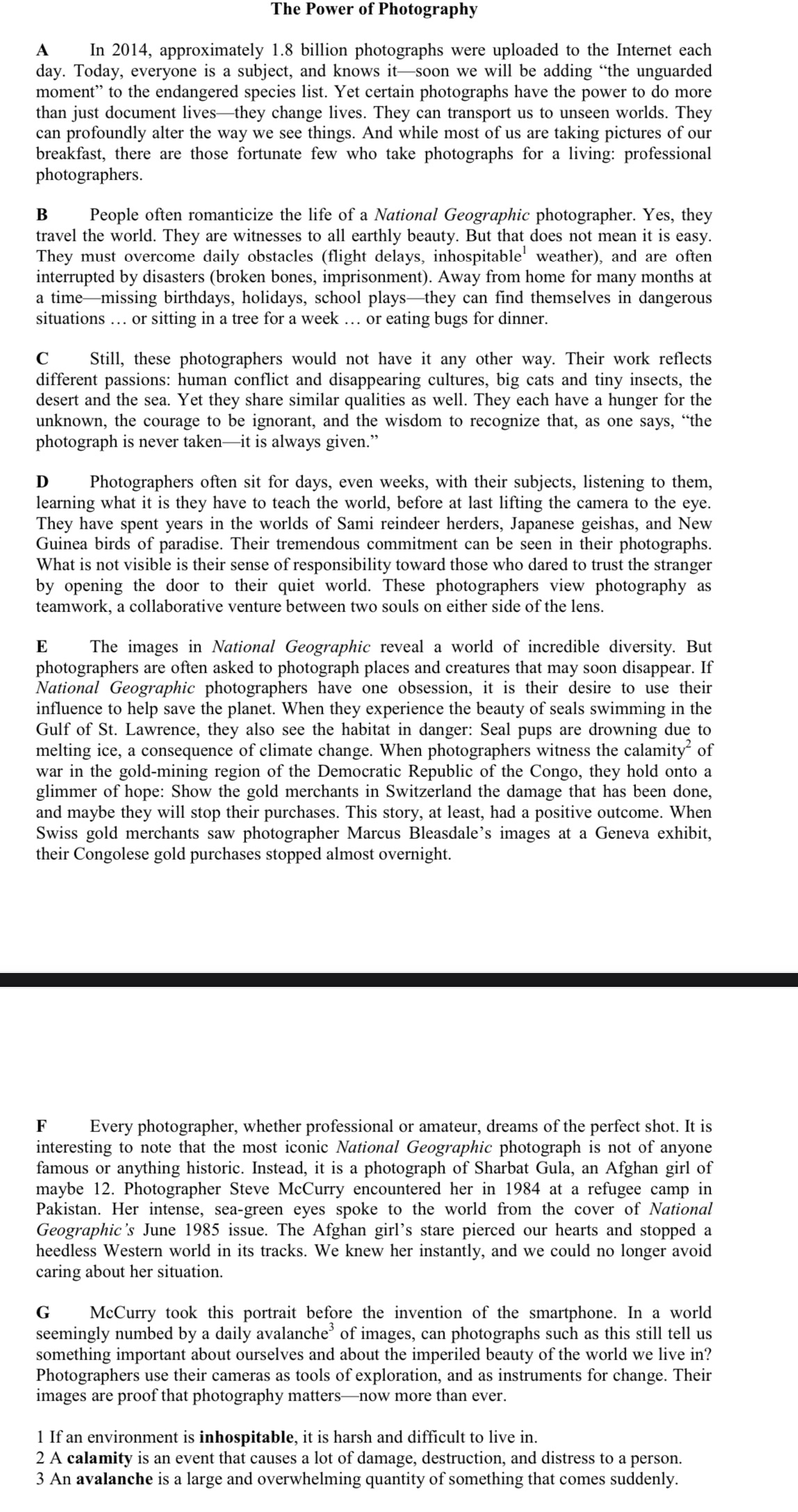Please what is the answer for this question( 4. Which of the following is a difficulty that is NOT mentioned in the reading?a. eating bugsb. broken bonesc. low payd. missing holidays)
The Power of Photography A In 2014, approximately 1.8 billion photographs were uploaded to the Internet each day. Today, everyone is a subject, and knows itsoon we will be adding \"the unguarded moment\" to the endangered species list. Yet certain photographs have the power to do more than just document livesthey change lives. They can transport us to unseen worlds. They can profoundly alter the way we see things. And while most of us are taking pictures of our breakfast, there are those fortunate few who take photographs for a living: professional photographers. B People often romanticize the life of a National Geographic photographer. Yes, they travel the world. They are witnesses to all earthly beauty. But that does not mean it is easy. They must overcome daily obstacles (flight delays, inhospitable] weather), and are often interrupted by disasters (broken bones, imprisonment). Away from home for many months at a timemissing birthdays, holidays, school playsthey can find themselves in dangerous situations ... or sitting in a tree for a week ... or eating bugs for dinner. C Still, these photographers would not have it any other way. Their work reflects different passions: human conflict and disappearing cultures, big cats and tiny insects, the desert and the sea. Yet they share similar qualities as well. They each have a hunger for the unknown, the courage to be ignorant, and the wisdom to recognize that, as one says, \"the photograph is never takenit is always given.\" D Photographers often sit for days, even weeks, with their subjects, listening to them, learning what it is they have to teach the world, before at last lifting the camera to the eye. They have spent years in the worlds of Sami reindeer herders, Japanese geishas, and New Guinea birds of paradise. Their tremendous commitment can be seen in their photographs. What is not visible is their sense of responsibility toward those who dared to trust the stranger by opening the door to their quiet world. These photographers view photography as teamwork, a collaborative venture between two souls on either side of the lens. E The images in National Geographic reveal a world of incredible diversity. But photographers are often asked to photograph places and creatures that may soon disappear. If National Geographic photographers have one obsession, it is their desire to use their influence to help save the planet. When they experience the beauty of seals swimming in the Gulf of St. Lawrence, they also see the habitat in danger: Seal pups are drowning due to melting ice, a consequence of climate change. When photographers witness the calamity\" of war in the gold-mining region of the Democratic Republic of the Congo, they hold onto a glimmer of hope: Show the gold merchants in Switzerland the damage that has been done, and maybe they will stop their purchases. This story, at least, had a positive outcome. When Swiss gold merchants saw photographer Marcus Bleasdale's images at a Geneva exhibit, their Congolese gold purchases stopped almost overnight. F Every photographer, whether professional or amateur, dreams of the perfect shot. It is interesting to note that the most iconic National Geographic photograph is not of anyone famous or anything historic. Instead, it is a photograph of Sharbat Gula, an Afghan girl of maybe 12. Photographer Steve McCurry encountered her in 1984 at a refugee camp in Pakistan. Her intense, sea-green eyes spoke to the world from the cover of National Geographic's June 1985 issue. The Afghan girl's stare pierced our hearts and stopped a heedless Western world in its tracks. We knew her instantly, and we could no longer avoid caring about her situation. G McCurry took this portrait before the invention of the smartphone. In a world seemingly numbed by a daily avalanche of images, can photographs such as this still tell us something important about ourselves and about the imperiled beauty of the world we live in? Photographers use their cameras as tools of exploration, and as instruments for change. Their images are proof that photography mattersnow more than ever. 1 If an environment is inhospitable, it is harsh and difficult to live in. 2 A calamity is an event that causes a lot of damage, destruction, and distress to a person. 3 An avalanche is a large and overwhelming quantity of something that comes suddenly







